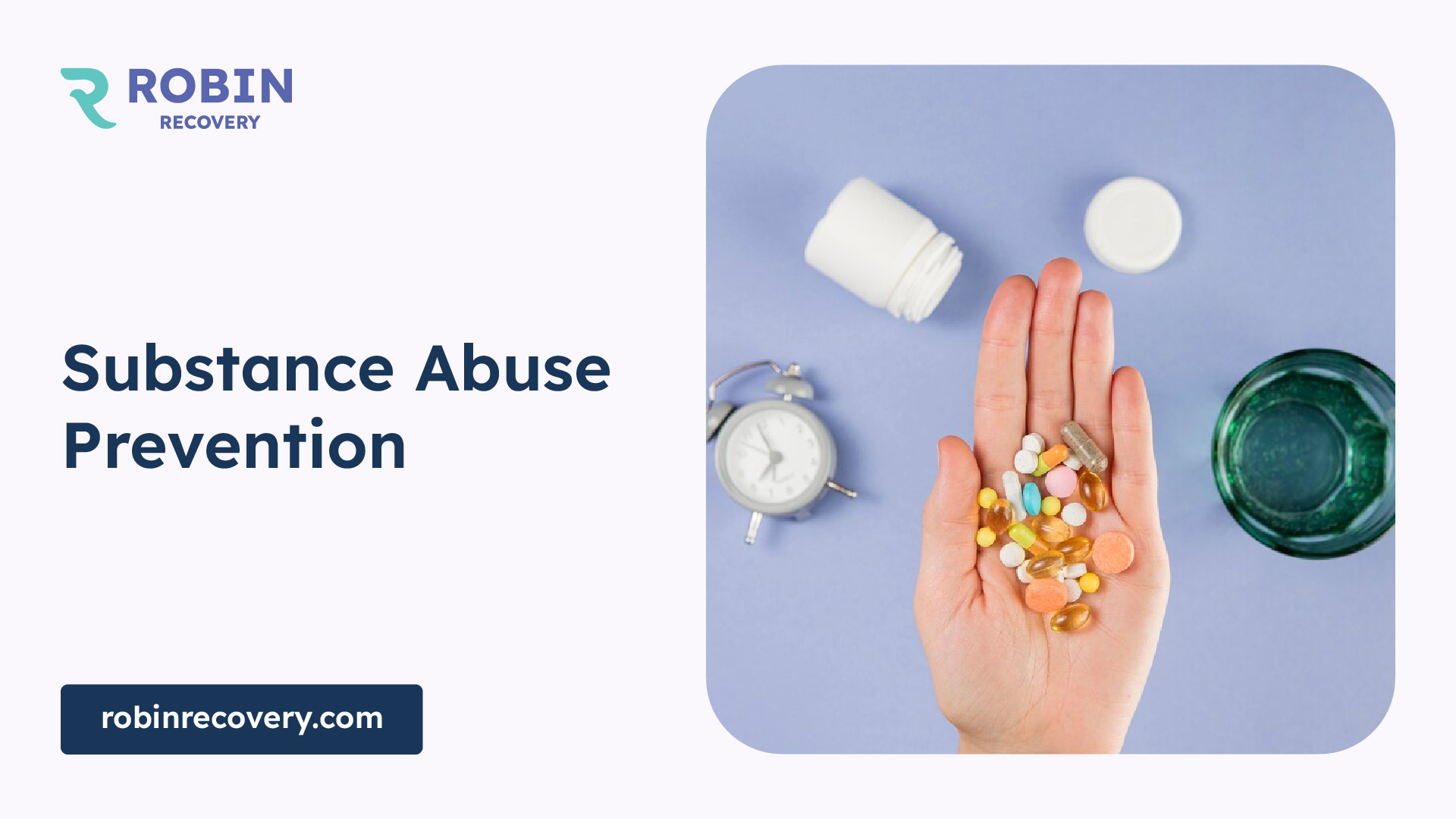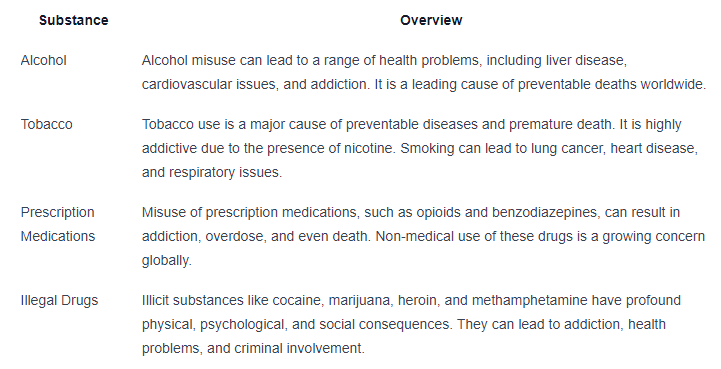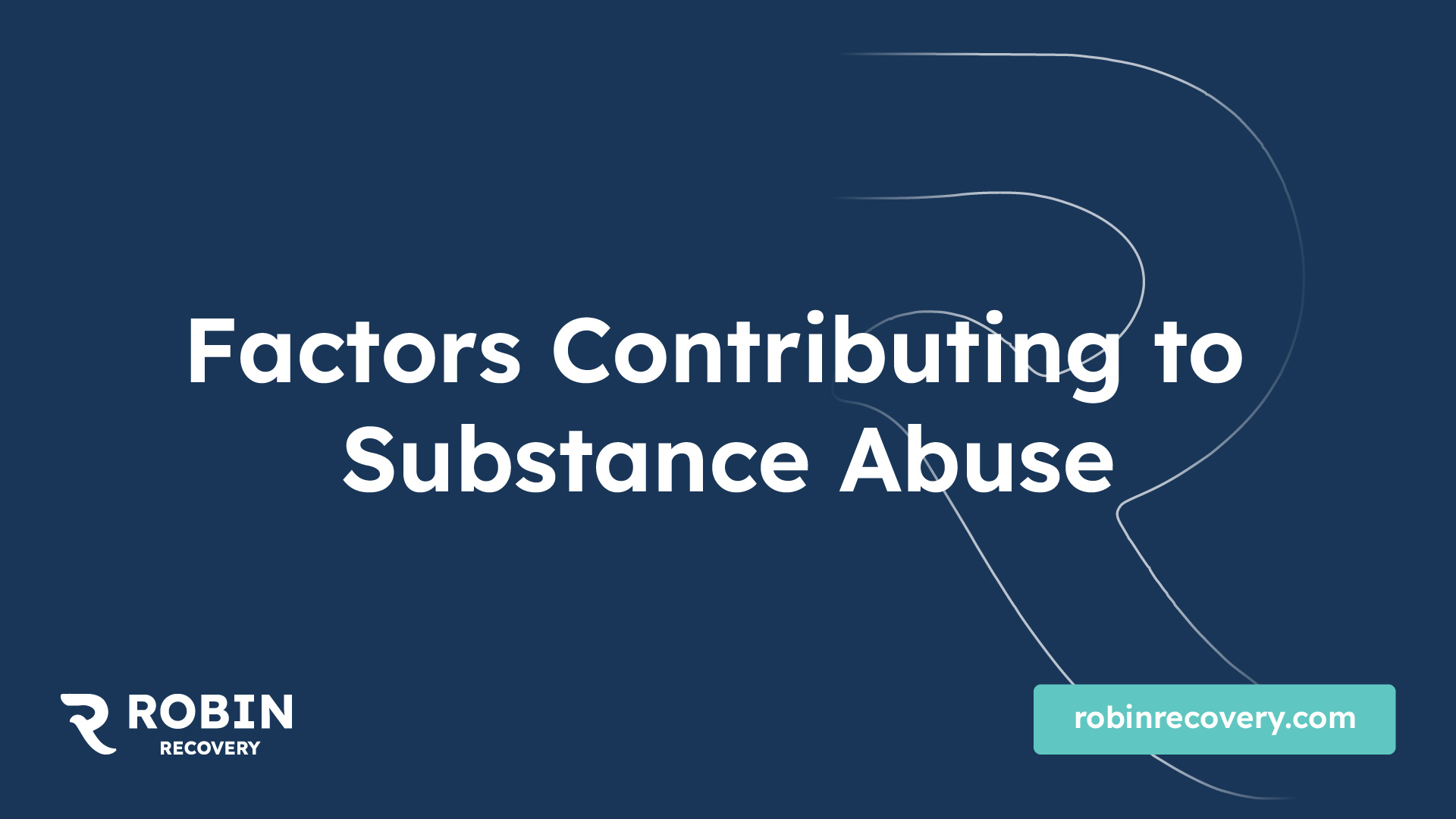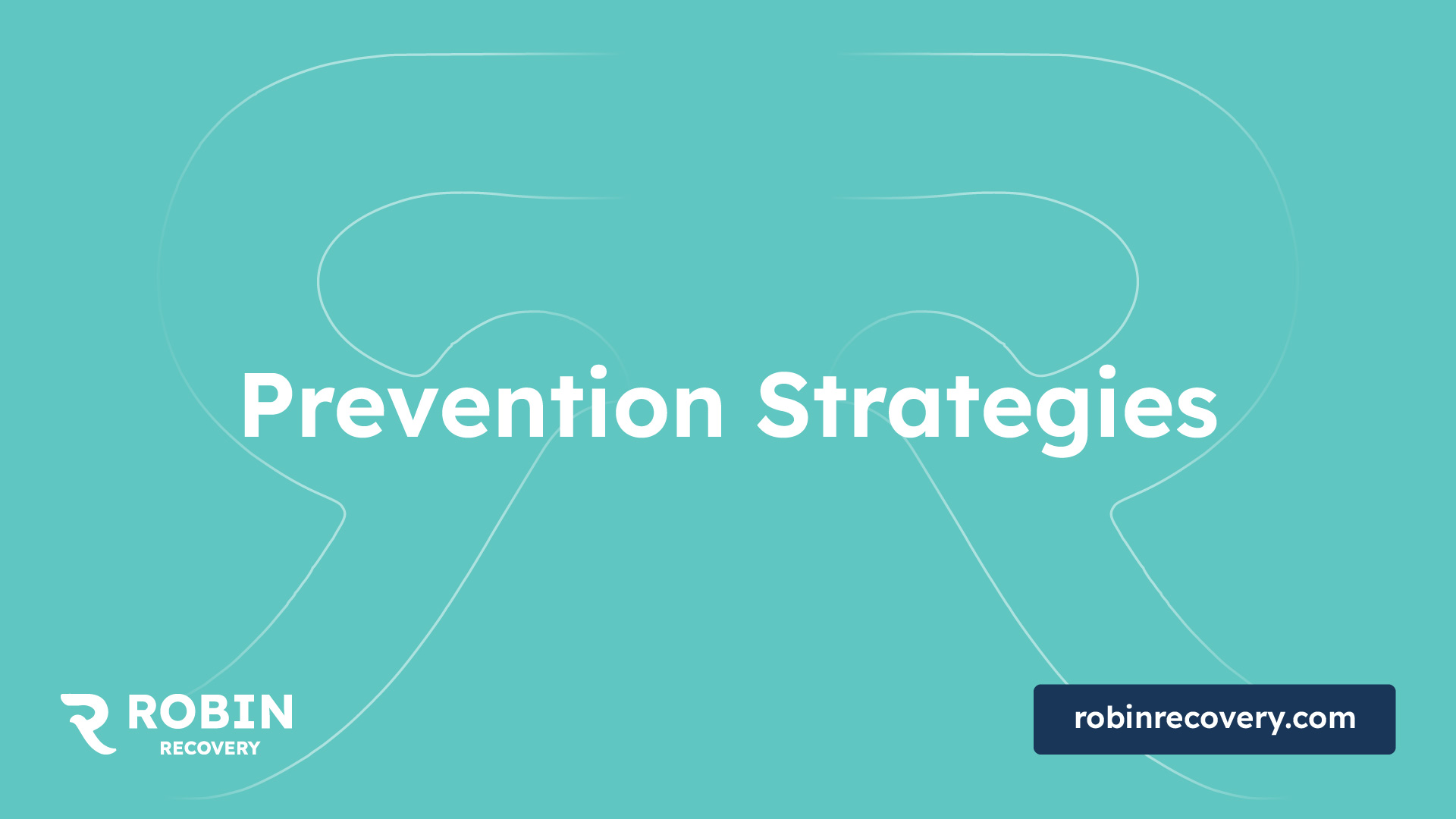Substance Abuse Prevention


Understanding Substance Abuse
Substance abuse is a complex issue that affects individuals from all walks of life. Understanding the definition and overview of substance abuse, as well as the commonly misused substances, is crucial in addressing and preventing this widespread problem.
Definition and Overview
Substance abuse refers to the excessive or harmful use of substances that can lead to negative consequences for an individual's physical and mental health, as well as their social and occupational functioning. It involves the misuse of substances such as alcohol, tobacco, prescription medications, and illegal drugs.
According to the National Institute on Drug Abuse (NIDA), commonly misused substances include:
- Alcohol: Alcohol is a depressant that can lead to impaired judgment, coordination, and liver damage when consumed excessively.
- Tobacco: Tobacco products, such as cigarettes and smokeless tobacco, contain addictive nicotine and can lead to various health problems, including lung cancer and heart disease.
- Prescription Medications: Certain prescription medications, when used improperly or without a prescription, can be highly addictive and dangerous. Examples include opioids, benzodiazepines, and stimulants.
- Illegal Drugs: Illicit substances like cocaine, marijuana, heroin, and methamphetamine have high abuse potential and can cause severe physical and psychological harm.
It is important to note that substance abuse encompasses a wide range of substances and behaviors. While the focus of this article is on substance abuse prevention, it is crucial to address other addictive behaviors like gambling, gaming, and internet addiction as well.
Commonly Misused Substances
To gain a deeper understanding of substance abuse, it is essential to explore the commonly misused substances in more detail. Here are some key facts about a few of these substances:

To combat substance abuse effectively, it is crucial to implement preventive measures, raise awareness, and provide support and resources for those struggling with addiction. By addressing the underlying factors contributing to substance abuse and promoting healthy coping mechanisms, we can make a significant impact on individuals, families, and communities. For more information on substance abuse prevention strategies, continue reading our article on prevention strategies.
Prevalence of Substance Abuse
Understanding the prevalence of substance abuse is crucial in addressing the issue and developing effective prevention strategies. By examining global statistics and specific populations, we can gain valuable insights into the extent of the problem.
Global Statistics
Globally, substance abuse remains a significant concern. In 2016, approximately 5.6% of individuals between the ages of 15 and 64 years abused substances at least once in their lifetime NCBI. The issue of substance abuse has multiplied among adolescents and young adults during the last decade, particularly among men aged 15-30 years.
Some key statistics regarding substance abuse include:

These figures highlight the widespread nature of substance abuse and the need for comprehensive prevention efforts.
Substance Abuse in Specific Populations
Substance abuse impacts various populations differently, with certain groups facing unique challenges. Understanding these specific populations can help tailor prevention strategies to address their specific needs.
- Children and Adolescents: Studies indicate that between one third and two thirds of child maltreatment cases involve some degree of substance use NCBI. Children affected by parental substance abuse are at a higher risk for various childhood disorders and face greater vulnerability to both externalizing and internalizing disorders.
- Foster Care Youth: Substance abuse in foster care is a significant concern. Youth in foster care are at higher risk of substance abuse due to various factors such as trauma, instability, and disrupted relationships.
- College Students: Substance abuse among college students is a prevalent issue. Transitioning to college life, academic stress, peer pressure, and easy access to substances contribute to increased substance abuse rates.
- During the Coronavirus Pandemic: The coronavirus pandemic has led to rising substance abuse rates globally. Isolation, stress, and disruptions to daily routines have contributed to increased substance misuse rising substance abuse during the coronavirus pandemic.
- Adolescents: National survey data indicates that while the prevalence rates of alcohol, tobacco, and drug use among adolescents have fluctuated over the years, substance abuse remains a significant concern. Non-medical prescription drug abuse, particularly of opiates, has been increasing among adolescents.
By recognizing the specific populations affected by substance abuse, targeted prevention strategies can be implemented to address their unique needs.
Understanding the prevalence of substance abuse globally and in specific populations is essential for developing effective prevention strategies. By utilizing this knowledge, we can work towards reducing substance abuse rates and promoting healthier, drug-free communities.

Factors Contributing to Substance Abuse
Understanding the factors that contribute to substance abuse is essential for developing effective prevention strategies. Substance abuse is a complex issue influenced by various biological, environmental, social, and psychological factors. By exploring these factors, we can gain insight into the root causes of substance abuse and work towards preventing its occurrence.
Biological and Environmental Factors
Biological factors play a significant role in the development of substance abuse. Genetic polymorphism has been associated with addiction, suggesting a genetic component in the etiology of addiction. Studies have shown a link between genetic variants and the risk of developing drug addiction, particularly with genes such as OPRM1 and BDNF [1]. However, it's important to note that genetics alone do not determine substance abuse outcomes, as environmental factors also play a crucial role.
Environmental factors can significantly influence substance abuse. Adolescents, in particular, are vulnerable to environmental influences due to their limited ability to accurately assess the risks of drug experimentation. Peer pressure, exposure to drugs, and a lack of parental supervision can increase the likelihood of substance abuse among young individuals. Additionally, availability and accessibility of drugs within the community can contribute to substance abuse rates. It's important to address these environmental factors through education, community support, and the implementation of preventive measures.
Social and Psychological Influences
Social and psychological influences also contribute to the development of substance abuse. Social influences, such as peer pressure and media influence, can significantly impact an individual's decision to experiment with drugs. Adolescents, seeking independence, maturity, popularity, and identity, may be more susceptible to these social pressures and may engage in substance use as a result [2]. Prevention efforts should focus on promoting positive attitudes towards substance-free lifestyles, providing accurate information about the risks of substance abuse, and fostering healthy peer relationships.
Psychological factors, such as mental health conditions and stress, can also contribute to substance abuse. Individuals experiencing mental health issues may turn to drugs as a way to cope with their symptoms. Additionally, stressors such as trauma, family conflict, or academic pressure can increase the likelihood of substance abuse. It's crucial to address mental health concerns and provide appropriate support systems to individuals at risk of substance abuse.
By understanding the biological, environmental, social, and psychological factors that contribute to substance abuse, we can develop comprehensive prevention strategies. These prevention strategies should encompass early intervention, education, community support, and the promotion of healthy coping mechanisms. By addressing the root causes and risk factors, we can work towards a future where substance abuse is minimized, and individuals are empowered to make healthier choices.
Impacts of Substance Abuse
Substance abuse can have far-reaching consequences, affecting both individuals and society as a whole. Understanding these impacts is crucial for highlighting the importance of substance abuse prevention efforts. In this section, we will explore the individual consequences and social and economic effects of substance abuse.
Individual Consequences
Substance abuse can significantly impact an individual's life across various domains, including psychological, physical, social, educational, and functional aspects. According to a study published by the National Center for Biotechnology Information (NCBI), substance abusers generally experience a lower quality of life compared to healthy non-abusers.
Psychologically, substance abuse can lead to mental health issues such as depression, anxiety, and mood disorders. Physical consequences may include organ damage, impaired cognitive function, and increased risk of accidents and injuries. Socially, substance abuse can strain relationships, leading to conflicts with family, friends, and colleagues. Educationally, substance abuse can hinder academic performance and limit future opportunities.
It's worth noting that certain populations, such as children of substance-abusing parents, are particularly vulnerable to the individual consequences of substance abuse. Estimates from the Child Welfare Information Gateway suggest that 12 percent of American children live with at least one parent who abuses alcohol or drugs. These children are at a higher risk of neglect, mistreatment, and poverty. Moreover, they face an increased likelihood of developing a substance use disorder themselves.
Social and Economic Effects
The impact of substance abuse extends beyond the individual level, affecting society as a whole. Substance abuse places a significant burden on communities and can lead to various social and economic consequences.
Within families, substance abuse can disrupt the loving and trusting relationships necessary for a healthy environment. Children may be forced into parental roles, assuming responsibilities for parents who are unable to function independently. Spouses may experience strained relationships, marked by secrecy, lies, and financial difficulties [3].
At the societal level, substance abuse contributes to increased healthcare costs, criminal justice system involvement, and reduced productivity. Treating substance-related health issues, such as addiction and related illnesses, strains healthcare resources and finances. Substance abuse also drives criminal activity, leading to arrests, incarcerations, and the associated costs of law enforcement and legal proceedings. Additionally, substance abuse impairs work performance and productivity, resulting in economic losses for individuals, businesses, and the overall economy.
To mitigate the individual and societal impacts of substance abuse, prevention efforts are crucial. By focusing on early intervention, education, community support, and family involvement, we can work towards reducing the prevalence and consequences of substance abuse. For more information on effective prevention strategies, explore our article on substance abuse prevention.
In the next section, we will delve into specific prevention strategies and programs that have shown effectiveness in addressing substance abuse.

Prevention Strategies
To combat the widespread issue of substance abuse, effective prevention strategies are crucial. These strategies aim to address the underlying factors that contribute to substance abuse and promote healthier alternatives. Two key prevention strategies are early intervention and education, as well as community and family support.
Early Intervention and Education
Early intervention and education play a vital role in preventing substance abuse. By providing individuals with accurate and comprehensive information about the risks and consequences of substance abuse, they can make informed decisions and develop resistance to peer pressure [4]. Educating children and adolescents about the dangers of substance abuse can empower them to make healthy choices and avoid falling into the trap of addiction.
Early intervention programs target individuals who may be at a higher risk of substance abuse due to various factors, such as family history or exposure to trauma. These programs provide support, counseling, and skills training to help individuals build resilience, develop effective coping mechanisms, and make positive life choices. By addressing risk factors early on, these programs aim to prevent the onset of substance abuse and promote healthier behaviors.
Community and Family Support
Community and family support are crucial elements in preventing substance abuse. Strong familial relationships and a supportive community environment can provide a protective shield against the allure of drugs and alcohol. Building healthy relationships within families and communities helps individuals develop a sense of belonging, self-worth, and purpose, which reduces the likelihood of seeking solace in substance abuse.
Community-based prevention programs focus on creating supportive networks, fostering positive peer relationships, and providing opportunities for engagement in constructive activities. By offering alternatives to substance use, such as sports, arts, and community service, these programs promote healthy lifestyles and discourage substance abuse.
Family support programs aim to strengthen family bonds, improve communication, and enhance parenting skills. These programs provide education and resources to parents and caregivers, equipping them with the tools to recognize warning signs of substance abuse, provide guidance, and establish open lines of communication with their children. By fostering healthy family dynamics and offering support, these programs contribute to a nurturing environment that reduces the risk of substance abuse.
By implementing early intervention and education programs and fostering community and family support, society can take significant strides in preventing substance abuse. These prevention strategies create a foundation for individuals to make informed choices, develop resilience, and lead healthier lives free from the grip of addiction. For additional tips on preventing substance abuse and maintaining a drug-free lifestyle, refer to our article on ways to avoid substance abuse relapse triggers.
Effective Prevention Programs
When it comes to substance abuse prevention, evidence-based programs have proven to be highly effective in reducing early drug use and promoting healthier behaviors. These programs are designed based on current scientific evidence, thoroughly tested, and proven to produce positive results. By targeting specific risk and protective factors, prevention programs aim to create a supportive environment that discourages substance abuse and promotes healthy alternatives.
Universal Interventions
Universal prevention programs are designed to reach a broad audience and are typically implemented in schools or community settings. These programs focus on promoting general well-being and resilience, targeting all individuals within a specific population, regardless of their risk level. The goal is to provide education, skills, and resources to everyone, with the aim of reducing the overall prevalence of substance abuse.
Universal interventions often involve educational campaigns, interactive workshops, and skill-building activities. By enhancing knowledge about the risks associated with substance abuse and equipping individuals with coping strategies, these programs empower participants to make informed decisions and resist peer pressure. They can be particularly effective in preventing the initiation of drug use among young people.
Targeted and Indicated Approaches
While universal interventions are valuable, targeted and indicated prevention approaches focus on specific populations or individuals who may be at higher risk for substance abuse. These programs address the unique challenges and risk factors faced by these groups, providing tailored interventions to effectively reduce the likelihood of drug use.
Targeted prevention programs may focus on specific populations such as adolescents in foster care (substance abuse in foster care), college students (substance abuse in college students), or individuals who have experienced trauma. By addressing the specific needs and risk factors associated with these populations, targeted prevention programs can make a significant impact on reducing substance abuse rates.
Indicated prevention approaches are designed for individuals who have already begun experimenting with drugs or are at the early stages of substance abuse. These programs aim to intervene early to prevent further progression and mitigate the potential harm associated with ongoing drug use. Indicated prevention may involve counseling, support groups, and individualized treatment plans to address the unique needs of each individual.
According to the National Institute on Drug Abuse, evidence-based prevention programs have the potential to save society money in medical costs and help individuals remain productive members of society. In fact, these programs can yield a return of up to $65 for every dollar invested in prevention efforts.
By implementing a combination of universal, targeted, and indicated prevention programs, communities can create a comprehensive approach to substance abuse prevention. These programs work together to address risk factors, promote protective factors, and ultimately reduce the prevalence of substance abuse. It is crucial to invest in evidence-based prevention strategies to create a healthier and drug-free future for individuals and communities alike.
References
[1]: https://www.ncbi.nlm.nih.gov/pmc/articles/PMC9731175/
[2]: https://www.ncbi.nlm.nih.gov/pmc/articles/PMC2916744/
[3]: https://americanaddictioncenters.org/rehab-guide/guide-for-families-i
[4]: https://www.pvamu.edu/sa/drug-and-alcohol-abuse-prevention-program-daapp/tips-for-preventing-substance-abuse/
